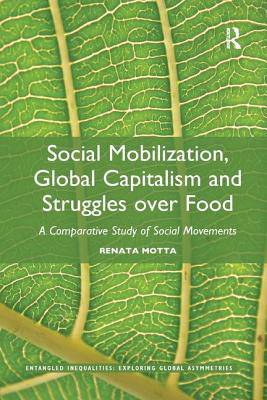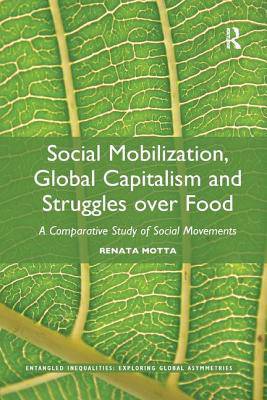
- Afhalen na 1 uur in een winkel met voorraad
- Gratis thuislevering in België vanaf € 30
- Ruim aanbod met 7 miljoen producten
- Afhalen na 1 uur in een winkel met voorraad
- Gratis thuislevering in België vanaf € 30
- Ruim aanbod met 7 miljoen producten
Zoeken
Social Mobilization, Global Capitalism and Struggles Over Food
A Comparative Study of Social Movements
Renata Motta
€ 59,45
+ 118 punten
Uitvoering
Omschrijving
This book explores the transformation of Brazil and Argentina into two of the world's largest producers of genetically modified (GM) crops. Systematically comparing their stories in order to explain their paths, differences, ruptures and changes, the author reveals that the emergence of the two nations as leading producers of GM crops cannot be explained by technological superiority of biotechnology; rather, their trajectories are the results of political struggles surrounding agrarian development, in which social movements and the rural poor contested the advancement of biotechnologically-based agrarian models, but have been silenced, ignored, or demobilized by a network of actors in favour of GM crops. Based on rich interview and media material collected amongst activists, the author highlights the importance of political struggles over GM crops not only to debates on agrarian futures and food security, but also as illustrations of the challenges faced by contemporary democracies. An international comparative study, this book raises the question of how social mobilization and rights claims can counter the systemic imperatives of global capitalism and political interests, at a time when regional governments are reliant on commodity booms, whilst globally, governments are obliged to introduce programmes of austerity. As such it will appeal to scholars of sociology, political science and geography with interests in social movements, development, globalization, inequality and political economy.
Specificaties
Betrokkenen
- Auteur(s):
- Uitgeverij:
Inhoud
- Aantal bladzijden:
- 204
- Taal:
- Engels
- Reeks:
Eigenschappen
- Productcode (EAN):
- 9781138358799
- Verschijningsdatum:
- 14/08/2018
- Uitvoering:
- Paperback
- Formaat:
- Trade paperback (VS)
- Afmetingen:
- 156 mm x 233 mm
- Gewicht:
- 379 g

Alleen bij Standaard Boekhandel
+ 118 punten op je klantenkaart van Standaard Boekhandel
Beoordelingen
We publiceren alleen reviews die voldoen aan de voorwaarden voor reviews. Bekijk onze voorwaarden voor reviews.











